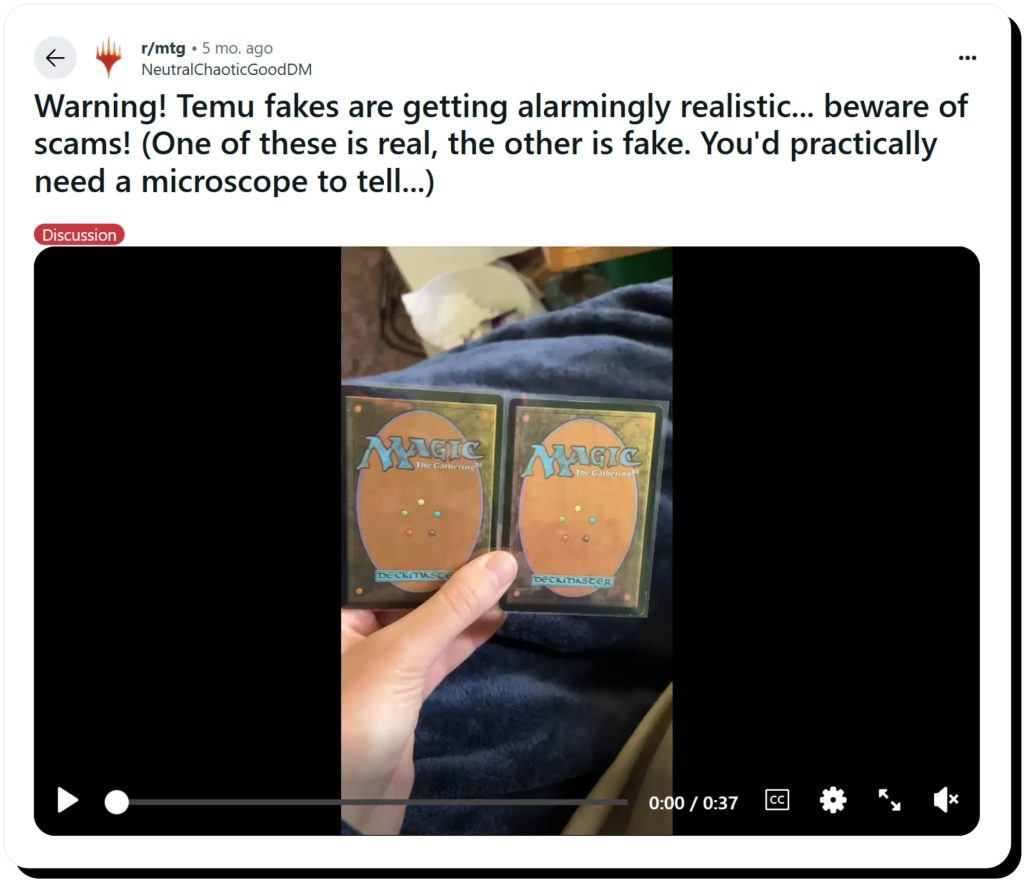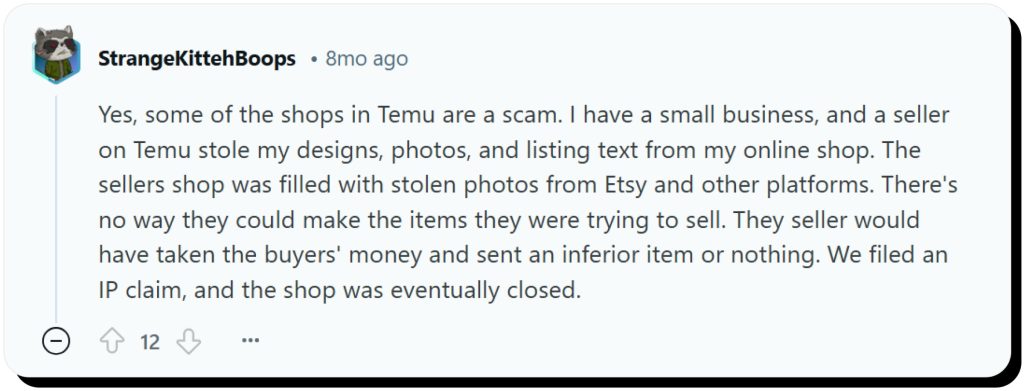Is Temu safe? A deep dive into the platform’s security and practices

Temu is generally considered safe from an online shopping perspective. However, the viral e-commerce powerhouse does come with certain privacy concerns:
- Temu implements security standards like encrypted connections and secure credit card payments to protect its users
- Most customers say they receive their products (though some report quality issues and slow shipping)
- At the same time, Temu collects a lot of personal information, and the app can access your contacts, camera, and location
- Temu shares user personal information with third-party companies
- Many are concerned the China-based app could be used to spy on U.S. citizens
So, is Temu safe to use? While you can expect to receive the products you order, privacy-conscious customers might want to proceed with caution.
What is Temu?
Temu is an online marketplace known for incredibly low prices, mainly achieved by connecting buyers directly with Chinese manufacturers.
Shoppers can find a wide range of products on Temu, including home décor, jewelry, clothing, sporting goods, electronics, pet supplies, and fashion accessories.
Since its founding in 2022, Temu has rapidly become one of the most popular shopping sites in the world. In its inaugural year, Temu was estimated to have $290 million in gross merchandise volume (GMV). By 2024, that figure had increased to $29.5 billion, and the company is forecasted to reach $41 billion GMV in 2025.
At the time of this writing, Temu was the second most visited ecommerce site in the world – trailing only Amazon – and the fourth most visited ecommerce site in the U.S., behind Amazon, eBay and Walmart.

Is Temu a legit company?
Yes, Temu is a legitimate company that is publicly traded on the NASADAQ under the ticker symbol PDD, making it subject to SEC oversight. That means Temu is regulated by a U.S. government agency that requires financial transparency and helps protect consumers against fraud.
Ownership and business model
Temu is owned by PDD Holdings, a Chinese company founded by Colin Huang in 2015 when he launched Pinduoduo, a social shopping platform in China. The company was originally based in Shanghai, but has moved to Dublin, Ireland (though it still has extensive operations in China). Temu’s U.S. operations are based in Boston, MA, registered under the name Whaleco, Inc.
Temu has a factory-to-consumer (F2C) business model: manufacturers list their products on Temu for shoppers to buy directly. This model eliminates middlemen like distributors and retailers to achieve low prices. The platform makes money by charging manufacturers a commission and through advertising fees.
The company also takes advantage of the De Minimis Tax Exemption, which allows low-cost products to be imported to the U.S. without paying duties.
Customer feedback and reputation
Temu’s reputation is mixed: it’s known for a massive selection of ultra-cheap products and a simple shopping experience, but it’s also criticized for slow shipping times, poor customer service, and poor product quality. It’s important to note, however, that those complaints reflect more on sellers than Temu itself, since sellers are ultimately responsible for product quality and shipping.
At the time of this writing, overall reviews reflected that reputation:
- BBB: Not accredited, B- rating with 4,178 complaints
- Trustpilot: 2.4-star rating based on 33,705 reviews. Just 32% of those are 5-star reviews compared to 48% 1-star reviews
- Reviews.io: 1.5-star rating from 2,545 reviews
- Sitejabber: 2.0-star rating out of 1,694 reviews
The service fares better with app store reviewers. On Apple, Temu had a 4.7-star rating from 1.7 million reviews, and on Google Play, it had a 4.6-star rating from 7.4 million reviews.
So, is Temu a reputable company? Based on public opinion, it seems Temu could work on improving its reputation.
Is it safe to order from Temu?
In general, you can expect to receive your Temu order, and Temu offers buyer protections such as payment security standards, returns, and refunds. However, many customers complain about poor product quality and long shipping times.
Product quality and shipping issues
While you can typically expect to receive the items you ordered on Temu, common complaints include:
- Poor quality
- Inaccurate product descriptions and photos
- Shipping can take anywhere from 7 to 20 days (or more)
- Damaged products
So, is Temu reliable? Mostly, but the onus lies with you to do proper research and avoid questionable listings and offers that are too good to be true.

Refund and return policies
Temu’s purchase protection program features:
- Free returns for up to 90 days (with one free return shipping per order)
- Full refunds if items are lost or can’t be delivered, arrive damaged, or don’t match their descriptions
The company also offers late delivery compensation. If your order isn’t delivered by the latest date provided, Temu will credit your account $5 for standard shipping and $13 for express shipping.
Payment security
Temu employs the same security standards as other major ecommerce platforms:
- Web pages served over HTTPS: prevents hackers from intercepting your credit card numbers and other sensitive information
- TLS and SSL: encrypt data so it can’t be read even if it is intercepted
- PCI DDS credit card compliance: strict protocols that safeguard credit card data
In addition to major credit cards like Visa, MasterCard, Discover, and American Express, Temu accepts payment methods that allow you to skip adding your credit card information. Those include Google Pay, Apple Pay, Venmo, PayPal, and Cash App.
Temu also accepts “buy now, pay later” services such as Affirm, Afterpay, and Klarna.
What about privacy and data collection?
While Temu collects much of the same type of data that other ecommerce platforms do, the service has come under fire for aggregating more information than necessary.
Temu’s data practices and Privacy Policy
Temu collects a significant amount of user data, including personal information such as your:
- Name, address, phone number, and email address
- Device information
- Social media accounts (if linked to Temu)
- Chat messages
- Photos and videos shared in reviews
- Shopping behavior
Temu’s mobile app takes data collection to another level, as many say its permissions allow it to access your:
- Location
- Camera
- Photos
- Contacts
- Calendar
- Text messages
- Biometric data
Though Temu has protocols to opt out of data collection in states that grant those rights, per Temu’s Privacy Policy Addendum for U.S. Residents, the company says it might decline opt-out requests if permitted by law.
Does the app have access to too much?
Many believe the app has access to too much information. For example, why would a shopping app need access to user cameras, contacts, photos, texts, and biometric data? Does Temu steal your information? Some believe the Chinese government could use the app to spy on U.S. citizens or install malware to steal information.
In fact, in 2023, PD Holdings’ Pinduoduo app was suspended from Google Play because it was found to contain malware, lending credence to the idea that Temu could be used for similar purposes. Grizzly Research has even called Temu “the most dangerous app in wide circulation.”
Does Temu share data with third parties?
Temu shares user information with third-party services such as:
- Advertising and marketing companies that track which ads you click and serve targeted advertisements
- Data brokers for fraud detection
- Payment processors
- Affiliates for order fulfillment
Notably, such sharing practices are very similar to other ecommerce platforms. However, Temu is less transparent in terms of specific third parties your data may be shared with and whether it’s anonymized before sharing.
Temu scams and red flags to watch out for
Fake products and false listings
Like on many other shopping platforms, scammers post fake products and false listings on Temu. The items look legit, but when your order arrives, it’s clear the product is a poor-quality counterfeit or doesn’t match the description. In some cases, the product never even arrives.
Red flags:
- “Name brand” items with ultra-low pricing – even by Temu standards
- Poor-quality product images
- All 5-star reviews, especially when posted in a short span
- Seller profile has very little information

Temu imitation scams
In this scam, you will be contacted by someone claiming to be a Temu customer service representative. They might call or send a phishing email or smishing text. Their goal is to convince you to give them your personal information, account access, or payment details.
Red flags:
- Unsolicited calls, texts, or emails claiming to be from Temu
- Messages that urge you to act “immediately” or state your account will be locked/ deleted
- Being asked to share personal data, login, or payment information
Fake codes and promotions
You might see an ad on social media with an amazing Temu promotion or code. When you click the link, it takes you to a fake Temu website designed to steal your personal information and payment details.
Red flags:
- Social media posts and ads promoting too-good-to-be-true Temu deals
- Being required to share personal details to get the offer
- Non-Temu URLs (they might look very similar)
Gift card scams
Scammers will attempt to sell you Temu gift cards – but the gift cards don’t work when you try to use them. You’ve paid the scammers (who have disappeared) and lost your money.
Red flags:
- Gift cards sold on third-party websites
- “Discount” gift cards
- Limited payment options, such as Cash App and crypto
Affiliate link scams
This scam takes advantage of Temu’s legitimate affiliate program, where users share a link or referral code and get a commission when someone uses it to make a purchase. In this case, scammers get the commission – and sometimes, links can lead to malicious websites.
Red flags:
- Links sent by strangers
- Requests for personal information to get the link
- Masked or shortened links
Tips for safer online shopping
Though there are legitimate concerns about unscrupulous sellers, Temu is still a relatively safe place to shop – provided you do it mindfully and follow these security tips.
Use secure payment methods
Always use secure payment methods that have built-in buyer protection. Major credit cards offer fraud protection, you can use virtual credit cards, and services such as PayPal, Google Pay, and Apple Pay keep your credit card number private.
Limit the data you share
Share as little information as possible with Temu. Only fill out required form fields, never use Single Sign-On, and consider using dummy email addresses. If you’re using the app, review and restrict permissions – like access to your camera, contacts, and location – to protect your privacy. If possible, have your order sent to a P.O. box instead of your home address to keep it private.
Look for the blue checkmark
On Temu, a blue checkmark on listings means the seller’s identity and business have been verified and are considered more trustworthy. Only order products from verified sellers.
Never buy gift cards from third-party sellers
Only purchase gift cards directly from Temu, not third-party websites or sellers.
Don’t respond to unsolicited calls, texts, or emails
If you receive a call from someone claiming to be a Temu representative, hang up. If you receive a suspicious text or email claiming to be from Temu, don’t reply, click any links, or share any personal information. Instead, contact Temu through its official contact page to see if the issue is legit.
Check reviews – but be aware of fake reviews
Always check product and seller reviews on Temu before adding a product to your cart – but keep in mind that some scammers can add fake reviews that make them look trustworthy. If all the reviews are positive or if something seems too good to be true, that’s a red flag to avoid.
Don’t use unsolicited links or codes
Don’t use links or codes that you didn’t request. Instead, only use promo links and codes from Temu or known and trusted affiliates.
Use a strong password and 2FA
Always use a strong password and two-factor authentication to help prevent unauthorized access to your account.
How Onerep can help
The more information that scammers can find about you, the easier it is for them to impersonate customer service reps, use your contact info to send convincing emails and texts, or even try to access your Temu account.
Onerep protects your personal information by opting you out of 230 people-search sites. These websites expose your home address, phone numbers, emails, estimated income, estimated credit score range, assets, and other sensitive details to anyone willing to look you up. Since people-search sites can’t control who accesses them, that “anyone” can easily include scammers and identity thieves.
By removing your information from these websites, Onerep keeps it out of the fraudsters’ hands and vastly decreases the chances of being targeted in Temu scams.
FAQs
Is Temu a scam or legit?
Temu is a legitimate shopping platform, so it’s not a scam. However, there are many Temu scams users need to be aware of.
Is Temu safe to buy from?
In general, yes, Temu is safe to buy from as it follows industry security standards and offers buyer protections. However, it’s important to remember that scammers can still list fake or misrepresented products. Always follow best practices such as buying from verified sellers and using secure payment methods.
Is Temu trustworthy?
Whether you can trust Temu depends on your perspective. As a shopping platform, Temu safeguards credit card information and encrypts user data. However, it still shares user data with third-party companies, and many believe Temu could be used by the Chinese government to spy on U.S. citizens.
Can I get a refund from Temu?
Yes, Temu offers full refunds if items are damaged, don’t match the product description, or do not arrive. To request a refund, browse to Your Orders and select Return/Refund. Choose the items you want refunded and follow the prompts.
Is the Temu app safe to install?
The Temu app requests a lot of permissions – including access to your camera and device location – and another app by its parent company, China-based PDD Holdings, was previously suspended from Google Play for containing malware. Many are concerned that the Temu app could be used to spy on U.S. citizens. If you decide to install the app, make sure to deny all data access requests that aren’t needed for Temu to fulfill the service.
Does Temu sell or misuse user data?
While Temu says it doesn’t sell data in the traditional sense, it also admits that the nature in which it shares data with third parties could be considered selling data. It’s difficult to say whether Temu misuses data as it’s not transparent enough about its practices, but there are significant concerns about what it does with it.





Mark comes from a strong background in the identity theft protection and consumer credit world, having spent 4 years at Experian, including working on FreeCreditReport and ProtectMyID. He is frequently featured on various media outlets, including MarketWatch, Yahoo News, WTVC, CBS News, and others.